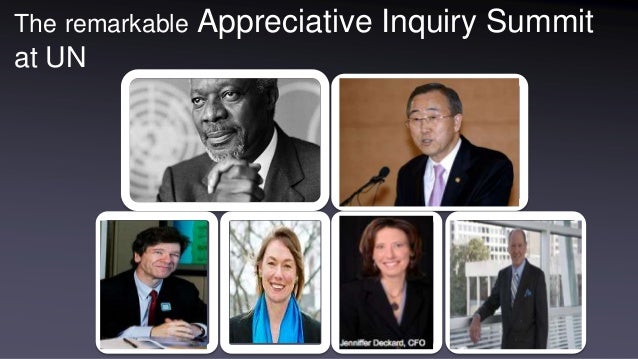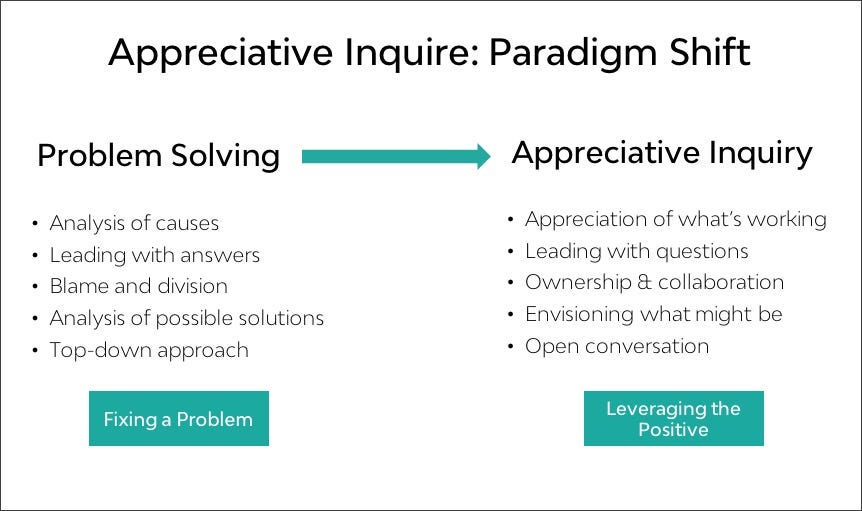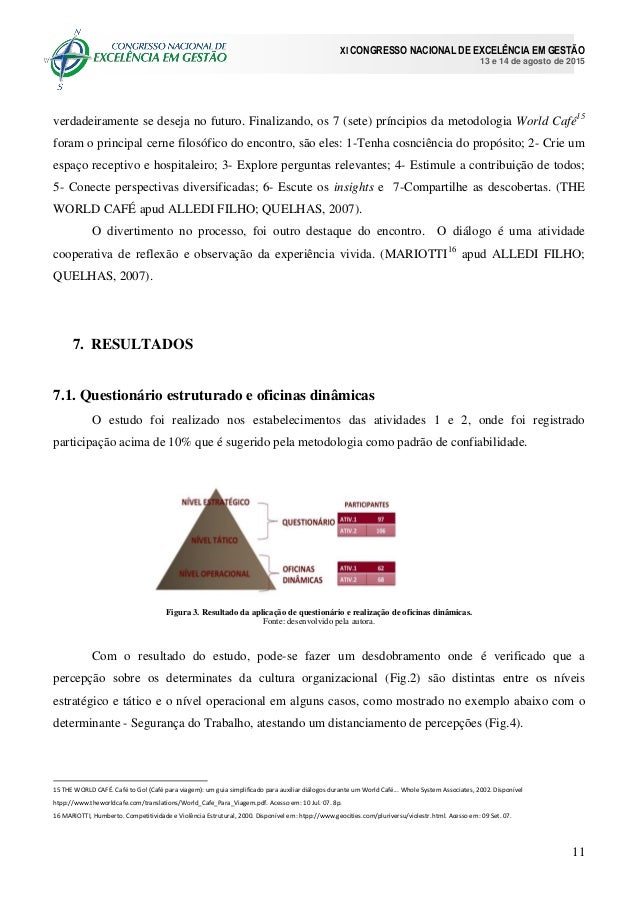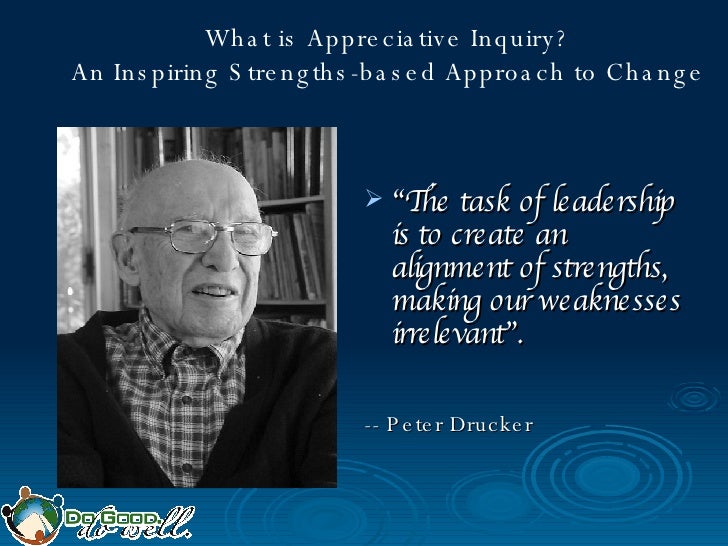David cooperrider appreciative inquiry pdf
1 A Positive Revolution in Change: Appreciative Inquiry David L. Cooperrider and Diana Whitney (Draft) Introduction Appreciative Inquiry (AI) begins an adventure.
10/10/2005 · Read a free sample or buy Appreciative Inquiry by David Cooperrider & Diana D. Whitney. You can read this book with Apple Books on your iPhone, iPad, iPod touch, or Mac. You can read this book with Apple Books on your iPhone, iPad, iPod touch, or Mac.
organisational development and arose from the work of David Cooperrider, The 4-D Model of Appreciative Inquiry (Cooperrider and Whitney 1999) Discovery – Appreciating what gives life . The purpose of the Discovery phase is to
Yet, Appreciative Inquiry did not begin life as an organizational change technique; it began as a research method for making grounded theory-building more generative (Cooperrider, 1986; Cooperrider and Sekerka, 2006).
The Appreciative Inquiry Model The originator of AI, David Cooperrider, emphasizes the limitations of problem solving for expanding human large scale appreciative inquiries. Empirical assessments of AI are limited, but are more plentiful than for most organizational change strategies. There is a growing body of longitudinal and critical research that is identifying moderating and
Mirror Flourishing: Appreciative Inquiry and the Designing of Positive Institutions – David Cooperrider, PhD. Sourced through Scoop.it from: www.youtube.com It was a real honor for me to keynote day-two of the World Conference in Positive Psychology.
Introduction to Appreciative Inquiry Appreciative Inquiry Appreciative Inquiry (AI) was developed by David Cooperrider in the 1980s. The model is based on the premise that organizations change in the direction in which they inquire. So an organization that inquires into problems will keep finding problems but an organization that attempts to appreciate what is best in itself will discover more
Appreciative Inquiry: An Overview Appreciative Inquiry is a very effective approach to changing organizational culture. It offers an effective and exciting way to re-think the way organizations make sense of the world and the basic interactions between individuals. Appreciative Inquiry (often known as AI) was developed by David Cooperrider and Suresh Srivastva in the 1980s. The approach is
appreciative inquiry case study in spanish With the aid of an Argentinean volunteer, Julieta Mazzola, we wrote a case study of the use of Appreciative Inquiry in three communities. This case study includes explanations of the use of this method and can be used as a methods manual.
New David L. Cooperrider Center for Appreciative Inquiry. Dedicated on November 8, 2014, The David L. Cooperrider Center for Appreciative Inquiry at Champlain College became the only academic center in the world focused entirely on Appreciative Inquiry. The stated purpose of the Center is to educate leaders to be the best in the world at seeing the best for the world, in order to discover and
David Cooperrider and Ronald Fry are professors of organizational behavior at the Weatherhead School of Management, Case Western Reserve University (CWRU). CWRU’s Department of Organizational Behavior is consistently acknowledged as one of the best in the world by the Financial Times. Together with their mentor, Suresh Srivastva, they created Appreciative Inquiry (AI) over 30 years ago
David Cooperrider, Case Western Reserve University, Organizational Behavior Department, Faculty Member. Studies Environmental science and policy, Conceptual Framework, and Infection and immunity.
Research Paper Appreciative Inquiry Applied to Health

David Cooperrider biography quotes publications and
Cooperrider, David L., Srivastva, Suresh (1987) “Appreciative Inquiry in Organizational Life”, in Woodman and Pasmore (Eds .) Research in Organizational Change and Development, Vol. 1, JAI Press.
Appreciative Inquiry Tapping into the River of Positive Possibilities ©Herb Stevenson President & CEO The Cleveland Consulting Group, Inc. 9796 Cedar Road Novelty, Ohio 44072 440 338 1705 Http://ClevelandConsultingGroup.com Background David Cooperrider realized that
David Cooperrider, the originator of a relatively new approach to organizational or institutional change called Appreciative Inquiry, tells the story of a conversation he had with the father of modern management, Peter Drucker, before his recent
Research Paper By Antonio Novais (Wellness Coach, PORTUGAL) The Birth. The birthplace of Appreciative Inquiry (AI) happened in the doctoral program in Organizational Behavior at Case Western Reserve University in the collaboration between David Cooperrider and Suresh Srivastva in 1980.
David Cooperrider is a professor of social entrepreneurship and founder of Appreciative inquiry. Read more about his biography, quotes and publications. Read more about his …

an excerpt from Appreciative Inquiry Handbook: For Leaders of Change by David L. Cooperrider, Diana Whitney and Jacqueline M. Stavros Published by Berrett-Koehler Publishers
Appreciative Inquiry and URI Appreciative Inquiry is a philosophy for change that was created by Professor David Cooperrider and his associates at Case Western Reserve University. The URI has used Appreciative Inquiry interviews at its gatherings since 1996 to help create relationships which are at the heart of the URI’s growth and appeal.
AI was developed by David Cooperrider and colleagues in the 1980s. It comes from a practical Appreciative inquiry into organisational life, he says, should have four characteristics. It should be: •! Appreciative: looking for the ‘positive core’ of the organisation or some aspects of it and seeking to build on these as a foundation for future growth. As indicated above this is not
Appreciative Inquiry (AI) founder David Cooperrider and long-time AI consultant Diana Whitney answer this question with engaging stories about AI change initiatives in many types of organizations, including British Airways Customer Service, Roadway Express, the City of Denver, Colorado, Office of Finance, and Hunter Douglas Window Fashions Division.
Appreciative Inquiry is based on the work of David Cooperrider, who in 1980 as a doctoral student at Case Western Reserve University intended to study physician leadership in one of the most highly regarded medical cen-
Appreciative Inquiry – An Overview What is Appreciative Inquiry? Appreciative Inquiry (AI) Dr. David Cooperrider and his associates at Case Western Reserve University discovered AI in the mid-1980’s while conducting a traditional organizational assessment and change consultation with the Cleveland Clinic. Over the past twenty years AI has gained increasingly widespread acceptance as a
APPRECIATIVE INQUIRY IN ORGANIZATIONAL LIFE David L. Cooperrider and Suresh Srivastva ABSTRACT This chapter presents a conceptual refiguration of action-research based on a “sociorationalist” view of science. The position that is developed can be summarized as follows: For action-research to reach its potential as a vehicle for social innovation it needs to begin advancing …
Cooperation’ with David Cooperrider; and ‘Appreciative Inquiry: A Positive Approach to Building Cooperative Capacity’ with Frank Barrett. He has developed and conducted a certificate program in Appreciative Leadership and Organizational Capacity Building in over 30 countries. He leads International Studies & Projects on important subjects in OB domain. He also consults with a variety …
The David L. Cooperrider Center for Appreciative Inquiry aims to be the global center of excellence in Appreciative Inquiry and strengths-based organizational management. Based in the Robert P. Stiller School of Business at Champlain College in Burlington, Vermont, the Center offers educational programs, research, Appreciative Inquiry certification, and consulting services for companies
CORE APPRECIATIVE INQUIRY PRINCIPLES. The Core Principles of Appreciative Inquiry, which describe the basic tenets of the underlying Ai philosophy, were developed in the early 1990’s by David Cooperrider and Suresh Srivastva (Cooperrider’s advisor at Case Western Reserve University).

Read “Appreciative Inquiry A Positive Revolution in Change” by David Cooperrider with Rakuten Kobo. Written by the two most recognized Appreciative Inquiry thought leaders A quick, accessible introduction to one of the m…
appreciative inquiry (AI) movement originated by David Cooperrider and his associates in the US, which is providing a more promising look at the future. In contrast to the mainstream “deficit” model of change, AI examines how positive change can be facilitated. Philanthropic Quest International suggests that (AI) is “an exciting new paradigm for human development and social innovation
David Cooperrider and Diana Whitney describe four steps in the appreciative inquiry cycle the four D’s are Discovery, Dream, Design and Destiny. 2 How does AI work? A typical Appreciative Inquiry design (called the 4D cycle of Appreciative Inquiry) would have four stages. 1. Discovery –Inquire into the best of the past and the present. Choose the positive as the focus of inquiry. 2. Dream
Integrating gender into appreciative inquiry activities is essential. For this reason, the authors have For this reason, the authors have included ideas for integrating gender awareness at every stage of appreciative inquiry.
Appreciative Inquiry download The Management Centre
The purpose of Appreciative Inquiry is therefore to build on the root causes of success – not of failure, to build on our strengths – not our weaknesses. David Cooperrider – founder of Appreciative Inquiry
Appreciative inquiry is a philosophy, as well as an approach for motivating change that focuses on exploring and amplifying strengths. AI was developed initially in the late 1980’s as a transformational
David Cooperrider, then a graduate stu-dent at Case Western Reserve University, was hired to conduct an organizational diagnosis of the Cleveland Clinic to find out what was wrong with the way the organization was operating. During his research, he was amazed by the level of The Power of the Positive Question In 1982 researchers at the University of Wisconsin conducted a study of the …
known as Appreciative Inquiry, developed by David Cooperrider2 at Case Western Reserve University in the mid-1980s. This approach has radically transformed our perspective on working with people — and consequently our understanding of the search process. Cooperrider’s Research As part of his doctoral studies, Cooperrider was involved in doing a traditional organizational development – the sarah connor chronicles episode guide Appreciative Inquiry (AI) was developed during the 80s by David Cooperrider and his associates at Case Western Reserve University, USA, as an innovative method for …
Appreciative Inquiry This approach was developed at Case Western University by David Cooperrider, Frank Barrett and Suresh Srivistra. In contrast with the traditional problem solving approach that looks to analyse what is going wrong, Appreciative Inquiry seeks to identify what works in organisations, and to construct future propositions based on the best of what we do. By grounding the
A Positive Revolution in Change: Appreciative Inquiry . David L. Cooperrider . Case Western Reserve University . and . Diana Whitney . The Taos Institute . Introduction . Appreciative Inquiry (AI) begins an adventure. The urge and call to adventure has been sounded by many people and many organizations, and it will take many more to fully explore the vast vistas that are now appearing on …
David L. Cooperrider is Professor and Chairman of the Department of Organizational Behavior at the Weatherhead School of Management, Case Western Reserve University. He is the author or coauthor of nine books. His 1987 article Appreciative Inquiry Into Organizational Life (with Suresh Srivastva) introduced the concept of Appreciative Inquiry.
Appreciative Inquiry (AI) was developed by David Cooperrider in the 1980s. When he was When he was doing his PhD he interviewed leading clinicians at the Cleveland Clinic about their greatest
PDF On Jan 1, 2005, David L. Cooperrider and others published A Positive Revolution in Change: Appreciative Inquiry
David Cooperrider influenced by earlier writings by Schweitzer 1980 Cleveland Clinic Project is initiated.The birthplace and co-founding of AI happened in the doctoral program in Organizational Behavior at Case Western Reserve University in the collaboration between David Cooperrider and…
David Cooperrider On A New Model For Change. Today’s Guest. My guest today is David Cooperrider, renowned for his research in appreciative inquiry, a strength-based approach to …
Appreciative Inquiry was adopted from work done by earlier action research theorists and practitioners and further developed by Dr David Cooperrider and Suresh Srivastva.
David Cooperrider is credited with the origination of Appreciative Inquiry in the 1980s while he was a doctoral student at Case Western Reserve University (Cooperrider, 1986; Bushe, 2012).
Appreciative Inquiry is a participatory form of inquiry. It puts a different focus on how information is It puts a different focus on how information is collected, analysed and used, compared to traditional monitoring and evaluation methods.
Principles of Appreciative Inquiry The Center for
The Power of Appreciative Inquiry A Practical Guide to Positive Change Diana Whitney & Amanda Trosten-Bloom Foreword by David Cooperrider Second Edition
In 1987, David Cooperrider and Suresh Srivastva introduced Appreciative Inquiry as a form of action research with the generative capacity to create a sense of …
His 1987 article Appreciative Inquiry Into Organizational Life (with Suresh Srivastva) introduced the concept of Appreciative Inquiry. Visit Author Page – Diana Whitney Diana Whitney, Ph.D. is the president and founder (along with David Cooperrider) of the Corporation for Positive Changeùan international center for Appreciative Inquiry education and consultation.
• to David Cooperrider and his colleagues at Case Western University for pioneering appreciative inquiry and sharing their findings so generously • to my colleagues in the Cambridge Partnership for Organisational Transformation who have taught me so much, and especially to Mette Jacobsgaard with whom I shared much of the fieldwork reported in this volume • to my colleagues in Trinity
developed in the 1980s by David Cooperrider of Case Western Reserve University and is being used by a grow- ing number of corporations and non- profit organizations around the world. “The more you focus on problems, the more you slow yourself down,” says Jane Magruder Watkins, a leading Al practitioner and coauthor (with Bernard J. Mohr) of the book Appreciative Inquñy: Change at the Speed of
Cooperrider’s Research Appreciative Way

Leadership Abstract February 2006 Volume 19 Number 2
David L. Cooperrider has 29 books on Goodreads with 2068 ratings. David L. Cooperrider’s most popular book is Appreciative Inquiry: A Positive Revolution…
A Contemporary Commentary on Appreciative Inquiry in Organizational Life, David Cooperrider (2013), ISBN: 978-1848554887, doi: 10.1108/S1475-9152(2013)0000004001 In the fourth edition of Advances in Appreciative Inquiry, David shared his latest ideas about Appreciative Inquiry in organizational life.
David Cooperrider – founder of Appreciative Inquiry Appreciative Inquiry is a process for change which builds on what is already working & valued. Ai works on the premise that whatever we focus on, we empower, creating more of it.
AI PowerPoint Presentation by David Cooperrider (link to 59 slides from AI Commons) that he created to be used as an Appreciative Inquiry training module. It includes a slide of the 4-D cycle, which is commonly used in organizations as a process for implementing Appreciative Inquiry.
Appreciative Inquiry on the other hand is a methodology that focuses on the positive – on what went right, on what was done well – and builds on these good news stories. This doesn’t make it
Appreciative Inquiry eBook by David Cooperrider

The Power of Appreciative Inquiry
Appreciative Inquiry, a leading-edge organizational development methodology, was developed in the mid-1980s by David Cooperrider at the Weatherhead School of …
Professors David Cooperrider, Case Western Reserve University, and Champlain College, thought-leader of Appreciative Inquiry and Martin Seligman, University of Pennsylvania, father of positive psychology share a passion to bring positive education into schools around the world.
The David L. Cooperrider Center for Appreciative Inquiry is the global Center of Excellence in Appreciative Inquiry and strengths-based organizational management.
All about the latest research & practices in Appreciative Inquiry. Inspiration from colleagues all over the world. Leading authors on Appreciative Inquiry.
David Cooperrider Strategic Advisor and Honorary Chair


David Cooperrider Ph.D. The Taos Institute
https://en.wikipedia.org/wiki/Talk%3AAppreciative_inquiry
Introduction to Appreciative Inquiry Excerpts
see what i have done sarah schmidt pdf – Change through Appreciative Inquiry. rosewoodcoaching.com
Appreciative Inquiry and URI URI


Foundations of Appreciative Inquiry History Criticism
Appreciative Inquiry PrismaFoundation.org
David Cooperrider Google Scholar Citations
The Power of Appreciative Inquiry
Appreciative Inquiry – An Overview What is Appreciative Inquiry? Appreciative Inquiry (AI) Dr. David Cooperrider and his associates at Case Western Reserve University discovered AI in the mid-1980’s while conducting a traditional organizational assessment and change consultation with the Cleveland Clinic. Over the past twenty years AI has gained increasingly widespread acceptance as a
His 1987 article Appreciative Inquiry Into Organizational Life (with Suresh Srivastva) introduced the concept of Appreciative Inquiry. Visit Author Page – Diana Whitney Diana Whitney, Ph.D. is the president and founder (along with David Cooperrider) of the Corporation for Positive Changeùan international center for Appreciative Inquiry education and consultation.
David Cooperrider – founder of Appreciative Inquiry Appreciative Inquiry is a process for change which builds on what is already working & valued. Ai works on the premise that whatever we focus on, we empower, creating more of it.
New David L. Cooperrider Center for Appreciative Inquiry. Dedicated on November 8, 2014, The David L. Cooperrider Center for Appreciative Inquiry at Champlain College became the only academic center in the world focused entirely on Appreciative Inquiry. The stated purpose of the Center is to educate leaders to be the best in the world at seeing the best for the world, in order to discover and
David L. Cooperrider is Professor and Chairman of the Department of Organizational Behavior at the Weatherhead School of Management, Case Western Reserve University. He is the author or coauthor of nine books. His 1987 article Appreciative Inquiry Into Organizational Life (with Suresh Srivastva) introduced the concept of Appreciative Inquiry.
The Appreciative Inquiry Model The originator of AI, David Cooperrider, emphasizes the limitations of problem solving for expanding human large scale appreciative inquiries. Empirical assessments of AI are limited, but are more plentiful than for most organizational change strategies. There is a growing body of longitudinal and critical research that is identifying moderating and
appreciative inquiry case study in spanish With the aid of an Argentinean volunteer, Julieta Mazzola, we wrote a case study of the use of Appreciative Inquiry in three communities. This case study includes explanations of the use of this method and can be used as a methods manual.
10/10/2005 · Read a free sample or buy Appreciative Inquiry by David Cooperrider & Diana D. Whitney. You can read this book with Apple Books on your iPhone, iPad, iPod touch, or Mac. You can read this book with Apple Books on your iPhone, iPad, iPod touch, or Mac.
1 A Positive Revolution in Change: Appreciative Inquiry David L. Cooperrider and Diana Whitney (Draft) Introduction Appreciative Inquiry (AI) begins an adventure.
Cooperation’ with David Cooperrider; and ‘Appreciative Inquiry: A Positive Approach to Building Cooperative Capacity’ with Frank Barrett. He has developed and conducted a certificate program in Appreciative Leadership and Organizational Capacity Building in over 30 countries. He leads International Studies & Projects on important subjects in OB domain. He also consults with a variety …
David Cooperrider, the originator of a relatively new approach to organizational or institutional change called Appreciative Inquiry, tells the story of a conversation he had with the father of modern management, Peter Drucker, before his recent
developed in the 1980s by David Cooperrider of Case Western Reserve University and is being used by a grow- ing number of corporations and non- profit organizations around the world. “The more you focus on problems, the more you slow yourself down,” says Jane Magruder Watkins, a leading Al practitioner and coauthor (with Bernard J. Mohr) of the book Appreciative Inquñy: Change at the Speed of
David Cooperrider and Ronald Fry are professors of organizational behavior at the Weatherhead School of Management, Case Western Reserve University (CWRU). CWRU’s Department of Organizational Behavior is consistently acknowledged as one of the best in the world by the Financial Times. Together with their mentor, Suresh Srivastva, they created Appreciative Inquiry (AI) over 30 years ago
Appreciative Inquiry and URI URI
Appreciative Inquiry What Works
David Cooperrider, then a graduate stu-dent at Case Western Reserve University, was hired to conduct an organizational diagnosis of the Cleveland Clinic to find out what was wrong with the way the organization was operating. During his research, he was amazed by the level of The Power of the Positive Question In 1982 researchers at the University of Wisconsin conducted a study of the …
David Cooperrider, Case Western Reserve University, Organizational Behavior Department, Faculty Member. Studies Environmental science and policy, Conceptual Framework, and Infection and immunity.
AI PowerPoint Presentation by David Cooperrider (link to 59 slides from AI Commons) that he created to be used as an Appreciative Inquiry training module. It includes a slide of the 4-D cycle, which is commonly used in organizations as a process for implementing Appreciative Inquiry.
All about the latest research & practices in Appreciative Inquiry. Inspiration from colleagues all over the world. Leading authors on Appreciative Inquiry.
10/10/2005 · Read a free sample or buy Appreciative Inquiry by David Cooperrider & Diana D. Whitney. You can read this book with Apple Books on your iPhone, iPad, iPod touch, or Mac. You can read this book with Apple Books on your iPhone, iPad, iPod touch, or Mac.
David Cooperrider, the originator of a relatively new approach to organizational or institutional change called Appreciative Inquiry, tells the story of a conversation he had with the father of modern management, Peter Drucker, before his recent
organisational development and arose from the work of David Cooperrider, The 4-D Model of Appreciative Inquiry (Cooperrider and Whitney 1999) Discovery – Appreciating what gives life . The purpose of the Discovery phase is to
Introduction to Appreciative Inquiry Appreciative Inquiry Appreciative Inquiry (AI) was developed by David Cooperrider in the 1980s. The model is based on the premise that organizations change in the direction in which they inquire. So an organization that inquires into problems will keep finding problems but an organization that attempts to appreciate what is best in itself will discover more
A Positive Revolution in Change Appreciative Inquiry
Appreciative Inquiry Berrett-Koehler Publishers
Read “Appreciative Inquiry A Positive Revolution in Change” by David Cooperrider with Rakuten Kobo. Written by the two most recognized Appreciative Inquiry thought leaders A quick, accessible introduction to one of the m…
David L. Cooperrider has 29 books on Goodreads with 2068 ratings. David L. Cooperrider’s most popular book is Appreciative Inquiry: A Positive Revolution…
appreciative inquiry case study in spanish With the aid of an Argentinean volunteer, Julieta Mazzola, we wrote a case study of the use of Appreciative Inquiry in three communities. This case study includes explanations of the use of this method and can be used as a methods manual.
David Cooperrider is a professor of social entrepreneurship and founder of Appreciative inquiry. Read more about his biography, quotes and publications. Read more about his …
David Cooperrider, Case Western Reserve University, Organizational Behavior Department, Faculty Member. Studies Environmental science and policy, Conceptual Framework, and Infection and immunity.
His 1987 article Appreciative Inquiry Into Organizational Life (with Suresh Srivastva) introduced the concept of Appreciative Inquiry. Visit Author Page – Diana Whitney Diana Whitney, Ph.D. is the president and founder (along with David Cooperrider) of the Corporation for Positive Changeùan international center for Appreciative Inquiry education and consultation.
PDF On Jan 1, 2005, David L. Cooperrider and others published A Positive Revolution in Change: Appreciative Inquiry

All about the latest research & practices in Appreciative Inquiry. Inspiration from colleagues all over the world. Leading authors on Appreciative Inquiry.
Appreciative Inquiry Summit CIVICUS
Introduction to Appreciative Inquiry University for Peace
The Power of Appreciative Inquiry A Practical Guide to Positive Change Diana Whitney & Amanda Trosten-Bloom Foreword by David Cooperrider Second Edition
Locating the Energy for Change An Introduction to
IMS018 Essentials of Appreciative Inquiry gcatd.org
AI Practitioner International Journal of Appreciative
David Cooperrider, the originator of a relatively new approach to organizational or institutional change called Appreciative Inquiry, tells the story of a conversation he had with the father of modern management, Peter Drucker, before his recent
Cooperrider’s Research Appreciative Way
Appreciative Inquiry What Works
Cooperrider, David L., Srivastva, Suresh (1987) “Appreciative Inquiry in Organizational Life”, in Woodman and Pasmore (Eds .) Research in Organizational Change and Development, Vol. 1, JAI Press.
David Cooperrider Case Western Reserve University
David Cooperrider biography quotes publications and